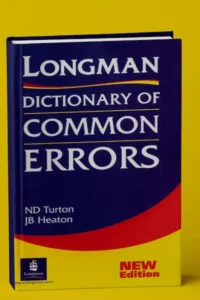Longman dictionary of common errors has Over 2500 alphabetical entries, with language notes giving clear explanations of the problems underlying each error.
- Authentic example sentences are taken from the British National Corpus showing correct use in the context.
- 30 special language features focusing on key problem areas.
- Illustrations to aid comprehension and reinforce meaning.
- Comprehensive cross-references help you locate entries easily.
- Glossary of all grammatical terms used in the entries.
Also Read: English Verbs
Longman Dictionary Of Common Errors
The Longman Dictionary of Common Errors provides learners and teachers of English with a practical guide to common errors and their correction. It contains the words and phrases which regularly cause difficulty for foreign learners, regardless of nationality and language background. Arranged alphabetically for ease of use, the entries deal with those errors that regularly appear in the written English of learners at the intermediate level of proficiency and above. Each error is accompanied by a correction and a short, simple explanation.
Since the appearance of the first edition of this dictionary almost a decade ago, dictionary making has been transformed by major developments in information technology. Today’s dictionary makers are able to draw upon huge computerized databanks to discover exactly how language is used. This new edition of the Longman Dictionary of Common Errors owes its authority to two such databanks: the Longman Learners’ Corpus and the British National Corpus.
The Longman Learners’ Corpus contains samples of the written English produced by students from over 70 different countries. With this carefully coded corpus of ten million words, it is possible to identify more clearly than ever before the words and phrases which cause problems for particular groups of learners and for learners in general. As a result, this second edition contains a large number of new entries, while first edition entries which are insufficiently supported by the corpus have been removed.
The investigation of common errors sometimes raises questions about usage for which there are no readily available answers. For example, what do native speakers usually say – ‘I disagree that heart transplants should be stopped.’ or ‘I don’t agree* that heart transplants should be stopped’? According to modern usage, is it usual to 2 say ‘She failed her examination.’ or ‘She failed in her examination’? Is it incorrect to say ‘More houses are built yearly.’ and, if so, why is yearly unacceptable here? In helping us to answer questions such as these, the British National Corpus has been an indispensable source of information. This large corpus of modern British English usage has been particularly useful in revealing the subtle differences-that make one word or phrase exactly right in a particular context, and others unsuitable.
Despite the recognized usefulness of computerized corporain dictionary making, this application of information technology is still relatively new. Accordingly, while we believe that this new edition is a major advance on the original, we welcome all comments and suggestions.
Also Read:


